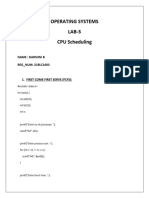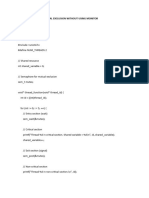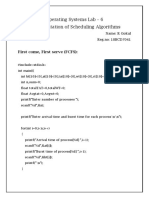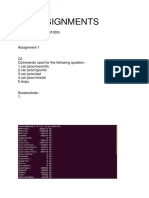0% found this document useful (0 votes)
27 views23 pagesOS - LAB Manual
The document contains C programming examples demonstrating various UNIX system calls, process management, thread concepts, CPU scheduling algorithms, IPC techniques, and solutions to classical synchronization problems. It includes code snippets for file management, process forking, threading, and different scheduling algorithms like FCFS, SJF, and Round Robin. Additionally, it covers IPC methods such as pipes, message queues, and shared memory, along with synchronization problems like the Dining Philosophers and Producer-Consumer problems.
Uploaded by
Deepak ChauhanCopyright
© © All Rights Reserved
We take content rights seriously. If you suspect this is your content, claim it here.
Available Formats
Download as PDF, TXT or read online on Scribd
0% found this document useful (0 votes)
27 views23 pagesOS - LAB Manual
The document contains C programming examples demonstrating various UNIX system calls, process management, thread concepts, CPU scheduling algorithms, IPC techniques, and solutions to classical synchronization problems. It includes code snippets for file management, process forking, threading, and different scheduling algorithms like FCFS, SJF, and Round Robin. Additionally, it covers IPC methods such as pipes, message queues, and shared memory, along with synchronization problems like the Dining Philosophers and Producer-Consumer problems.
Uploaded by
Deepak ChauhanCopyright
© © All Rights Reserved
We take content rights seriously. If you suspect this is your content, claim it here.
Available Formats
Download as PDF, TXT or read online on Scribd
/ 23
























































































